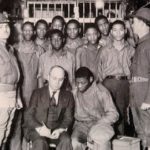If the constitutional guarantee of a fair trial is to be realized, the process used for selecting jurors must also be fair. Before Edmonson v. Leesville Concrete Co., the constitutional principle of equal protection under the law had been applied to federal jury selection practices in criminal trials but not in civil trials. In this lesson, students learn about jury selection and how the role and responsibilities of government in civil and criminal jury trials are viewed by the Supreme Court.
The Right to Remain Silent: Miranda v. Arizona

This documentary explores the landmark Supreme Court decision Miranda v. Arizona that said criminal suspects, at the time of their arrest but before any interrogation, must be told of their Fifth Amendment protection against self-incrimination and Sixth Amendment right to an attorney. The decision led to the familiar Miranda warning that begins “You have the right to remain silent…”
A Conversation on the Constitution: Jury Service
Gideon v. Wainwright (1963) Middle School Level

Does the Sixth Amendment’s right to counsel in criminal cases extend to defendants in state courts, even in cases in which the death penalty is not at issue? High school level also available.
This case summary provides teachers with everything they need to teach about Gideon v. Wainwright (1963). It contains background information in the form of summaries and important vocabulary at three different reading levels, as well a review of relevant legal concepts, diagram of how the case moved through the court system, and summary of the decision. This resource also includes nine classroom-ready activities that teach about the case using interactive methods.
Alabama v. Shelton (2002)
Does the Sixth Amendment right to appointed counsel apply to a defendant who was sentenced to a suspended sentence? This case summary shows how the Supreme Court answered that question in 2002.
Florida v. Powell (2010)
Does the failure to provide explicit advice of one’s right to have a lawyer present during questioning invalidate Miranda warnings? This case summary shows how the Supreme Court answered that question in 2010.
Twelve Angry Men: Trial by Jury as a Right and as a Political Institution
Twelve Angry Men, originally written for television by Reginald Rose in 1954 and subsequently adapted for stage (1955), film(1957) and television again (1997), effectively conveys the central importance of the right to a jury trial afforded by Article III of the Constitution as well as Amendments V, VI, and XIV.
To Kill A Mockingbird and the Scottsboro Boys Trial: Profiles in Courage
Constitutional Index – Trial by Jury in Criminal Cases Clause
The Constitutional Index breaks down the U.S. Constitution by Section, Amendment, and Clause and contains broader topics and themes. These are used to cross-reference Library resources in an effort to annotate constitutional history.
Your Right to Remain Silent: Miranda v. Arizona
In 1966, the Supreme Court’s 5-4 ruling in Miranda v. Arizona dramatically changed criminal procedures. The Court linked the Fifth Amendment’s privilege against self-incrimination to the Sixth Amendment’s guarantee of a right to counsel and applied both to protect a suspect’s rights from arrest through trial. This lesson plan is based on the Annenberg Classroom video “The Right to Remain Silent: Miranda v. Arizona.”


